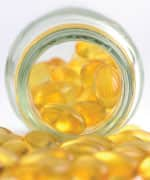Life Extension Magazine®
Omega-3 Heals the Heart
Results from a trial reported in the journal Circulation reveal improved heart function and less scarring in patients given omega-3 fatty acids for six months following a heart attack.*
The trial included 360 heart attack survivors who received fish oil-derived omega-3 or a placebo within a month of the attack. At the beginning and end of the treatment period, blood samples were analyzed for omega-3 levels, inflammation biomarkers and other factors, while magnetic resonance imaging evaluated cardiac structure and tissue characteristics.
At the end of the study, participants whose omega-3 index rose to the top 25% of subjects had a 13% reduction in left ventricular systolic volume index (a marker of heart remodeling) compared to those whose omega-3 levels were among the lowest. Participants who received omega-3 experienced significant reductions in markers of inflammation and heart muscle fibrosis.
Editor’s Note: The findings suggest a role for omega-3 in the prevention of cardiac remodeling, a condition characterized by alterations in heart shape and function that can occur after a heart attack, which is associated with heart failure.
*Circulation. 2016 Aug 1.
Vitamin D Associated with Shorter Hospital Stays in Ventilated Patients
 |
A pilot trial reported in the Journal of Clinical and Translational Endocrinology found that critically ill patients receiving mechanical ventilation who were given a high-dose vitamin D supplement had a shorter hospital stay in comparison with those who received a placebo.*
Researchers randomized 31 ventilated intensive care unit patients to receive 50,000 IU or 100,000 IU of vitamin D3 daily for five days. Thirteen of the subjects had deficient plasma 25-hydroxyvitamin D levels of less than 20 ng/mL at the beginning of the study. Blood samples were analyzed one and two weeks after the beginning of the treatment period to measure plasma vitamin D and other factors.
Average length of hospital stay was 25 days among those in the 50,000 IU group and 18 days in the 100,000 IU group, in comparison with 36 days in the placebo group. The high-dose vitamin D group thus spent half as much time hospitalized.
High doses were needed because these ICU patients were in acute need to rapidly build up their vitamin D levels.
Editor’s Note: “High-dose vitamin D may have multifactorial effects that could contribute directly or indirectly to hospital length of stay, including salutary effects via improved 25-hydroxyvitamin D levels on respiratory or other skeletal muscle function, by modulation of the pro-inflammatory milieu, and by regulation of immune functions, among other contributors,” authors Jenny E. Han and colleagues conclude.
*J Clin Transl Endocrinol. 2016 Jun;4:59-65.
Taurine and Magnesium Decrease Markers of Cardiovascular Disease Progression
 |
The journal Hypertension Research reported finding an increase in endothelial progenitor cells and a decrease in free radicals in association with supplementation with taurine and magnesium.*
The body’s endothelial progenitor cells repair the damage to the lining of the arteries that leads to cardiovascular disease. Free radical formation, when unchecked, is a factor involved in cardiovascular disease development.
More than 100 healthy men between the ages of 18 and 25 received 3 grams of taurine, 340 mg of magnesium, or a placebo daily for two weeks. Taurine and magnesium supplementation decreased measures of free radical damage over this two week period.
In comparison with pretreatment levels, endothelial progenitor cell colony-formation numbers, which reflect the vascular repair function of endothelial progenitor cells, significantly increased in study participants supplementing with taurine and magnesium.
Editor’s Note: “These findings indicate that the dietary intake of taurine and magnesium may prolong lifespan by facilitating the repair of impaired endothelial functions and thereby prevent the progression of cardiovascular diseases,” the authors observe.
Progenitor cells come from stem cells and serve many functions in repairing and maintaining tissues throughout our bodies. Regenerating the endothelial lining of our arteries has huge potential in reducing atherosclerosis incidence. Taurine and magnesium are ultra-low cost nutrients.
*Hypertens Res. 2016 Jul 14.
Drug More Than Doubles Chances of Five-Year Survival Rate
 |
According to a study presented at the annual meeting of the American Association for Cancer Research in New Orleans, patients with advanced melanoma who were treated with the immune-oncology drug Opdivo® had far higher survival rates. After 5 years, 34% of patients receiving Opdivo were alive compared to 16% of melanoma patients receiving conventional treatment methods.*
Significantly, oncologists say the results indicate that patients who survive for about four years are highly unlikely to relapse because their immune systems have eradicated or controlled their tumors.
Opdivo® is an immune checkpoint inhibitor. This type of drug blocks certain proteins made by some types of immune system cells, such as T cells, and some cancer cells. These proteins suppress immune responses and can keep T cells from killing cancer cells. When these proteins are blocked, the “brakes” on the immune system are released and T cells are able to better kill cancer cells.
Editor’s Note: The first checkpoint inhibitor to reach the market was Yervoy®. It targets a brake known as CTLA-4 and in a previous analysis was shown to result in long-term survival in about 17% of melanoma patients. A report on check-point inhibitor drugs was published in the June 2016 issue of Life Extension Magazine®. Oncology experts working with Life Extension® report favorable outcomes when checkpoint inhibitors are used against other malignancies.
*American Association for Cancer Research. 2016 April 16-20.

